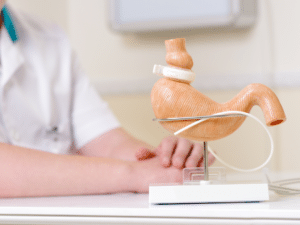Explore the advantages and potential drawbacks of opting for a Gastric Revision to a Gastric Bypass procedure, and how it can impact your weight loss journey.
Laparoscopic Sleeve Gastrectomy ( (LSG or VGS), also commonly called Gastric Sleeve Surgery, is the most performed bariatric surgery in the United States and worldwide. Each year, approximately 150,000 patients in the U.S. undergo VSG surgery and 380,000 worldwide.
During Gastric Sleeve Surgery, a portion of the patient’s stomach is removed and the remainder is stapled together to resemble a smaller sleeve-like pouch. The new stomach capacity is about 25% of its original size, limiting the amount of food the patient can consume in one meal.
Immediately after the surgery, patients often experience significant weight loss due to the special diet they must adhere to while their stomachs heal. Initially, they can only drink clear liquids for a week; then, in the second week, thicker liquids are allowed. Gradually, they can start to incorporate more solid foods into their diets, however, they must avoid processed or sugary foods. Ultimately, after four to six weeks, they can transition to a regular diet.
Sometimes, patients begin to gain back the weight they lost, and in some cases, the weight they gain can surpass their original weight. What causes this to happen? Can anything be done to stop the weight gain? Today we will discuss weight regain after gastric sleeve surgery and what can be done to stop it.
Consequences of Not Following Recommended Diet After Gastric Sleeve Surgery
After gastric sleeve surgery, it takes between a month and six weeks before the patient can begin to eat solid foods. The reduced stomach is much smaller, so it is important that they strictly adhere to the dietary guidelines they were provided with by their surgeon. Failure to follow these guidelines can result in various negative consequences, including:
Poor Nutrition
If they do not properly follow the dietary directives, they will not consume the proper amount of vitamins, nutrients, protein, etc. their body needs to function properly.
Dumping Syndrome
Although not as common as with gastric bypass patients, about 25% of gastric sleeve patients can become ill if they eat sugar-laden, fried, or processed foods. If they eat the wrong types of foods, they are at risk for dumping syndrome, which causes nausea, cold sweats, diarrhea, fatigue, flushing, heart palpitations, sweating, and low blood pressure.
Weight Gain
The stomach sleeve can stretch out gradually in response to the patient lacking portion control and continually overeating until it reaches almost its original size. This removes the restrictive nature of gastric sleeve surgery, and the patient will begin to gain weight.
What Causes Weight Regain After Gastric Sleeve Surgery?
Obesity is a complex disease, and many factors can influence a patient’s ability to lose weight and maintain that loss. Some of the factors that can influence a patient’s ability to lose or maintain weight include:
Patient Compliance
Patients must change their lifestyle habits after undergoing bariatric surgery if they desire to lose weight and keep it off. Patients must take action to achieve successful and sustainable weight loss. Bariatric surgery serves as a tool to help manage some of these challenges.
Genetics
A rare gene, or combination of genes, can affect appetite or metabolism rate.
Medical Conditions
Sometimes obesity is linked to a medical condition such as Cushing syndrome or medical issues that inhibit physical activity, such as arthritis.
Medications
Some medications inhibit weight loss, such as prescription antihistamines, antidepressants, antipsychotics, beta-blocking medications for type 2 diabetes, corticosteroids, etc.
Hormones
Hormones play a role in the appetite, metabolism, and the way body fat is distributed. Higher-weight individuals usually have an imbalance of hormones that promote fat accumulation. It is a vicious cycle because hormone imbalance and obesity feed off each other.
Stress
Our bodies produce a hormone in stress response called cortisol, which promotes the accumulation of fat and inhibits its use for energy.
How is Weight Gain Handled After Gastric Sleeve Surgery?
If the patient stops losing weight or, worse, begins to gain weight after gastric sleeve surgery, a revision from sleeve to mini gastric bypass may be necessary. To ensure the best outcome, we may convert the VSG to another form of bariatric surgery. We determine the best revision surgery for each patient based on the underlying cause of the weight gain.
If patient compliance is an issue and the stomach pouch has stretched out, we can tighten it through a sleeve revision to a mini gastric bypass, which also adds malabsorptive measures to restart weight loss.
Why Would the Patient Need Gastric Sleeve Revision Surgery?
Revising gastric sleeve surgery may be desirable if unexpected results arise; thus, a patient may opt for a mini gastric bypass or another type of bariatric surgery. To mitigate the risks associated with this decision, however, it is important to first consider the potential outcomes. Consider weight loss goals, overall health, and lifestyle changes before undergoing revision surgery.
The patient did not lose an adequate amount of weight a year after gastric sleeve surgery, the patient should have lost a significant amount of their excess body weight.
- The patient loses weight at first, then begins to gain significant weight sometimes, the stomach pouch stretches out despite their best efforts, and they need additional help that goes beyond portion control. A gastric sleeve revision to a mini gastric bypass can assist them in losing those extra pounds and getting back on track.
- Sometimes patients experience side effects that inhibit their quality of life, such as chronic, severe acid reflux or a hiatal hernia. The narrow midsection and defects of the smaller stomach’s valve both increase pressure, resulting in acid reflux and heartburn. Moreover, such pressure triggers the unwelcome rise of acid into the esophagus. Furthermore, this causes intense discomfort for the sufferer.
A Sleeve Gastrectomy Revision to a Mini Gastric Bypass or a Gastric Bypass may alleviate the side effects of acid reflux and prevent more damage.
What are the Benefits of a Gastric Sleeve Revision to a Mini Gastric Bypass?
When VSG surgery fails to provide the anticipated results, converting to another bariatric procedure may help achieve weight loss. We can transform gastric sleeve surgery into a biliopancreatic diversion with a duodenal switch or a Roux-en-Y gastric bypass. Ultimately, such conversions often enable patients to finally see the desired outcomes.
Suitable for Patients with Less Weight to Lose
If the patient lies within 100 pounds of their target weight, a gastric sleeve revision to a mini gastric bypass could prove advantageous. Conversely, for those with over 100 pounds of excess, a traditional gastric bypass might be the optimal choice.
Shorter Surgery
The revision to a mini gastric bypass procedure takes a shorter amount of time. Furthermore, carries a lower risk factor.
The First Step is Already Done
First, the surgeon performs Gastric Sleeve surgery to make the stomach smaller for a Mini Gastric Bypass. Then, instead of resecting like a traditional gastric bypass, the surgeon repositions a part of the intestine. Lastly, he attaches the intestine to the stomach.
Stops Weight Regain and Promotes Weight Loss
Adding the malabsorption technique of the mini gastric bypass will help stop the weight regain and promote additional weight loss.
What are the Drawbacks of a Gastric Sleeve Revision to a Mini Gastric Bypass?
However, despite its simpler process, mini gastric bypass surgery has a few drawbacks when compared to traditional gastric bypass. Nonetheless, it may be sufficient for some patients.
- It does not offer the same opportunity for weight loss as a gastric bypass. Because the malabsorptive capabilities of the mini gastric bypass are not as great.
- The mini gastric bypass does not usually offer as much relief from severe acid reflux as a traditional gastric bypass.
Is Revision Surgery from Sleeve to Mini Gastric Bypass Right For You?
You may qualify for revision surgery if you had gastric sleeve surgery but are unsatisfied with your weight loss results. Moreover, this might be an effective option for you.
You may be better served by revising your gastric sleeve. Depending on the weight you wish to lose, a mini gastric bypass or a duodenal switch could be effective. Furthermore, these options offer a better chance at success.
A consultation with a qualified bariatric surgeon like Dr. Chris Ibikunle can help determine the best option for you.
IBI Healthcare Institute’s experts can help you weigh the advantages and disadvantages of different bariatric revision surgeries. Additionally, they will assist in the evaluation process. Transitioning to sleeve gastrectomy revision to mini gastric bypass? Get in touch with us now for all the details.











